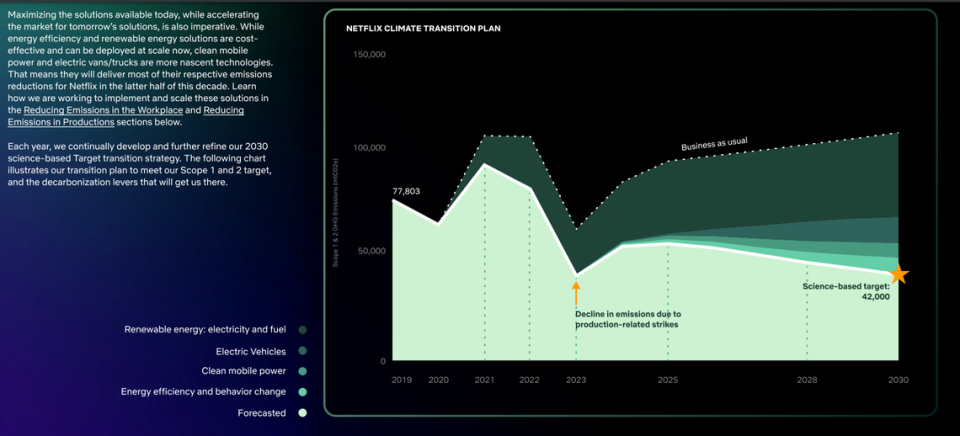A climate pledge that Netflix made in 2021 is materializing on the set of “Stranger Things” this year in Georgia.
The fifth and final season of one of Netflix’s most-watched original series is using solar power batteries, solar trailers, non-diesel generators and electric vehicles to reduce the company’s emissions, all while not compromising any film or production quality.
“Netflix has committed to cut emissions in half by 2030 to 2019 levels,” Shannon Bart, senior manager of sustainability and productions at Netflix, said during a panel discussion at the Climate Film Fest in New York this September. Bart said over half of the company’s emissions come from tv and film production.
Of the production emissions, 70% stem from vehicles and 30% are from diesel generators.
Since season five filming in and around Atlanta began in January, the film set has reduced generator fuel use by 40%, Netflix Communications Lead Adrian Zamora said in an email.
In 2019, Netflix emitted 77,803 metric tons of carbon dioxide emissions, according to the company’s latest environmental, social and governance report. That is roughly the equivalent of electricity used by 13,000 homes in the U.S. The streaming company’s 2030 target is 42,000 mtCO2 emissions. The company plans to keep increasing renewables, electric and clean mobile power to achieve that goal.
While production causes most emissions, the second-highest driver of emissions is something the company labels “corporate.” Streaming causes a single-digit percentage of the company’s emissions. Emissions were lower in 2023 because of production strikes. The numbers were expected to increase again this year.
“‘Stranger Things’ is an exciting use case for us because it’s the first production to use solar trailers and solar batteries on set,” Zamora said.
‘Stranger Things’ not the first, won’t be the last
Zamora told the Ledger-Enquirer that all productions directly managed by Netflix have incorporated some form of clean mobile power solutions or electric, plug-in hybrid vehicles.
“Over the last two years (2022-2023), 60% of our self-managed productions used clean mobile power, with 50% using some form of electric or hybrid vehicle,” Zamora said in an email.

Netflix original series “Virgin River” and “Bridgerton” have both embraced and experimented with electric generators too.
“During ‘Bridgerton’ season 3, production embraced a range of clean tech solutions including using a hydrogen power unit to power its basecamp and equipment trucks while filming,” Zamora said in an email.
“Virgin River,” filmed in Vancouver, didn’t opt for solar power in an area that has less sunlight and instead used batteries. During the series’ third season the production tested out batteries, and by the current sixth season they’ve completely replaced two diesel generators.
“It’s a season-over-season technology,” Zamora said.
The electric, battery-powered generators are quieter, which is a welcomed change/factor for people in and around production.
Reduced air and noise pollution is regular feedback that corporate receives when diesel generators are replaced with electric ones, according to Netflix communications.
Barriers to 100%: Education, equipment
Incorporating new technologies in a 130-year-old film industry has its challenges from equipment availability to educating production staff.
The technology isn’t available at scale yet. And much of the production equipment is shared throughout the film industry, leased and not owned, Netflix officials said.
“The entertainment industry is in a unique position because we don’t own any equipment we use for production,” Zamora said. “All EV, clean mobile power are all leased, we share equipment with others in Hollywood. So there is a supply issue,” Zamora said.
Netflix is launching an accelerator with Disney+, the Clean Mobile Power Initiative, to find startups to help find solutions to the problem. The cohort has seven mobile batteries, two mobile hydrogen power units, and one nanogrid from the disaster relief sector, according to Zamora.
Recognizing the need for set and production staff to learn how to use these technologies, Netflix added a regional sustainability advisor to each production.
“They have a strong background in production, and know the nuance of it all,” Zamora said. “It’s about building trust and education.”
EMEA Tribune is not involved in this news article, it is taken from our partners and or from the News Agencies. Copyright and Credit go to the News Agencies, email news@emeatribune.com Follow our WhatsApp verified Channel



